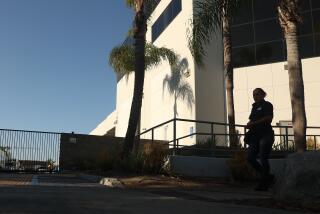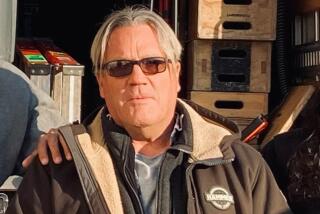Bucking the Union : Superior Industries Fights ‘Sweat Shop’ Label, Challenges NLRB
- Share via
Louis Borick doesn’t like to have his Superior Industries plant in Van Nuys called a sweat shop. Never mind that temperatures can reach 110 degrees inside the foundry, that doctors have said his workers face health risks from heat stress, that workers’ lunch breaks come in four- to six-minute intervals, that some of them earn only $4.25 an hour and that there has been a 250% turnover over five years.
About two months ago, the United Auto Workers got the go-ahead from the National Labor Relations Board to begin bargaining for Superior’s 1,200 workers. The UAW hoped to begin immediately improving working conditions. But it isn’t working out that way. Last Friday, Superior, which makes wheel rims for the Big Three auto makers, defied an order by the National Labor Relations Board to negotiate with the UAW.
Instead, Superior challenged the order in a 400-page appeal, contending that it had not been given a fair hearing and that the UAW had not legitimately won an election to represent Superior workers in August, 1984.
Baltazar Martinez, an international UAW representative, said, “They’re just stalling. We see no end to this strategy to keep appealing.”
The hostilities between Superior and the UAW began in August, 1984, when employees at Superior’s Van Nuys plant voted 478 to 410 in favor of having UAW local 645 represent them.
Election campaigning had been highly unorthodox. Employees received a letter just days before the vote on the letterhead of “Looie Boorish,” a parody of the name of Superior’s president, Louis Borick. It read, in part, “I’m a union buster from a way back. My special security guards have been instructed to bust the heads of any loudmouths that think they are going to cut themselves in on a piece of my pie.”
Both Borick and the union deny sending the letter. “You’d have to have a comedy writer to write that thing,” Borick said. “What did you think of it? Wasn’t it hysterical?”
That letter was not the only irregularity. Company officials accused union officials of brandishing rifles outside the polling places, according to NLRB testimony.
The company filed 118 objections with the NLRB, charging that the election was invalid and that union officials had bullied workers into voting for the UAW. Both sides slung allegations of bribery, deceit, intimidation and sabotage.
Superior executives even asked the FBI to investigate the union, charging that UAW local 645 was stockpiling weapons to aid Communist sympathizers in Central America, according to NLRB testimony.
On May 21, after many appeals, the NLRB in Washington issued its decision: The UAW election was valid, and all 118 objections were dismissed. In an earlier ruling upheld by the NLRB in Washington, the agency said the testimony of Superior’s key witness had been “fabricated, exaggerated, untruthful, biased, uncorroborated, contradicted, inconsistent and equivocating.” The ruling went on to allege that Superior had influenced that witness with money.
Superior is asking the NLRB to reconsider its decision. “We did not offer money to anyone whatsoever,” Borick said. “I’d have to be a fool to offer bribe money to any individual. In 30 years of doing business, I’ve never done that.”
Superior doesn’t think it got a fair hearing because the NLRB, which supervised the UAW elections, then ruled on whether those elections were properly conducted. Superior contends that the agency is not an unbiased and impartial adjudicator because it acts as its own judge.
Executives are fighting the UAW to the finish, fearing that a unionized work force may cut into the company’s profit margin, about 5.7%.
With only $3,000, Borick started Superior 40 years ago as a retailer of plastic seat covers. Today, Superior is the country’s largest wheel-rim manufacturer, with annual sales of almost $149 million, largely because it sells rims for less than anyone else. Most of its business, 75%, is with General Motors, Ford and Chrysler.
Superior has kept its prices low partly because it doesn’t have to pay the wages that a union demands. Workers in the foundry start out at about $4.25, although some workers earn as much as $15, according to Borick. By comparison, union workers with similar jobs in General Motors’ Van Nuys plant start at about $13.28, and can earn up to $15.65.
In the summer, the foundry gets extremely hot. Four former executives, all of whom requested anonymity, said the temperature averages 110 degrees during summer. “I couldn’t stand it for more than a half-hour, it was so bad,” said one.
Borick acknowledged the plant can hit fever temperatures. “On some summer days, it does get to 110. We provide as much cooling and relief as we can.”
Compounding the heat problem is a safety rule that workers wear long sleeves. “It’s like being in the Arizona desert but with two coats on,” says Alfredo Araujo, a former foreman and union supporter.
What’s more, foundry workers do not get scheduled lunch or rest breaks, Borick said. Instead, they eat during brief intervals in the manufacturing process. “They have between four and six minutes to eat while waiting for the machine,” said Borick, adding that those breaks come regularly. “They are paid for their lunch time.”
Borick says the casting machines can’t be shut down for a lunch recess because extremely hot aluminum must be poured into extremely hot molds. If the machines were shut off, Borick said, it would take four to five hours to get the molds to the 1,340 degrees necessary to accommodate molten aluminum.
Doctors’ Statements
Prolonged exposure to such intense heat can be damaging, said doctors who examined Superior workers in 1985. Dr. Paul Papanek and Dr. Melody Kawamoto, who were volunteers for the Los Angeles Committee on Occupational Safety and Health, examined about 20 Superior workers in the summer of 1985, at the request of the UAW. Papanek and Kawamoto were not admitted to the plant, and records of their examinations have been lost. “I do remember a lot of people were complaining about heat stress,” said Kawamoto.
Papanek said conditions similar to those at Superior can cause workers to feel “dizzy, weak . . . and dehydrated. They may have trouble moving muscles. They’ll feel bad.”
He recommended that the company schedule 20-minute rest breaks after 20 minutes of foundry work.
Borick said workers may have breaks whenever they want them, although the union disputes that.
The union also maintains that workers are forced to work overtime.
Borick acknowledges that most workers put in extra hours--five to 10 hours a week during a four-month peak season, but that they do so voluntarily.
Why haven’t more complaints been filed? Union officials say it’s because workers don’t know their rights and some of them are illegal aliens. “I knew a lot of guys who had fake IDs,” said Araujo.
Last INS Inspection
The Immigration and Naturalization Service last inspected the Van Nuys plant in 1983. “We felt they were making a very good effort to screen their employees,” said Nick Weyland, supervisory agent for the INS.
But, in the letter sent to employees before the election, the one that parodied Borick’s name, there was a suggestion that there were at least some illegals. “Either work for me or I call them Federals to get off their fat asses and get over here and load you guys up for the big trip south,” the letter read.
Borick denies knowingly hiring any illegals. “We will not jeopardize our company by hiring people who have any possibility of being illegals,” he said.
Turnover at Superior is high. Borick said the turnover rate averages 50% annually. He said the reason is that Superior trains unskilled workers who then sell their newly found abilities to other companies.
But the union says the company’s high turnover rate stems from its dismal working conditions.
David Adelstein, attorney for the UAW, estimates that the first union contract would call for at least a 50-cent-an-hour increase in wages and health benefits. With 1,200 workers, that would nick more than a million dollars a year off Superior’s net income.
Most Profitable Year
Superior had its most profitable year ever in 1986, with profits of $8.5 million. However, its stock, which is traded on the American Stock Exchange, fell $1, to $15.38, after the NLRB threw out the company’s objections. The stock has since recovered to $16.
Borick says that, despite his problems with the UAW, he has not considered selling the company nor shutting the plant. Probably, he will continue his fight against unionization.
What’s certain is that Borick will zealously clutch Superior’s purse strings. Characterized by former executives as a tough, tight-fisted entrepreneur, Borick said, “I do screen all of the purchase orders over $1,000, and I sign all checks over $20,000. We run a tight ship here.”
More to Read
Sign up for Essential California
The most important California stories and recommendations in your inbox every morning.
You may occasionally receive promotional content from the Los Angeles Times.













